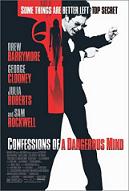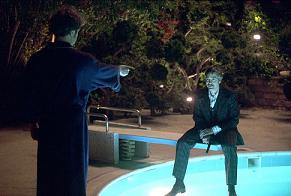Confessions of a Dangerous Mind

Right from the get go by simply reading the title of the film
Confessions of a Dangerous Mind, and from knowing that Charlie Kauffman’s script (warning enough) is based off of what Chuck Barris calls his “unauthorized autobiography”, there should be no doubt in a viewer’s mind that this film is going to be completely unreliably narrated.
Confessions opens with Chuck Barris (Sam Rockwell), the creator of “The Gong Show,” “The Newlywed Game,” and “The Dating Game,” in a very poor condition, standing naked in front of a television, heavily bearded, alone in a disheveled apartment in 1981 where he starts narrating about what got him to this squalid point in life. One gets the feeling that Chuck is watching his own life on one of his own shows, the ones he was criticized for by showcasing freaks, weirdoes and idiots who just wanted to be on television, get their moments of fame. Apparently Chuck Barris, naked and distraught in ’81, isn’t all that different from them.

Barris’s opening narration explains that through most of his early years his life was focused on getting laid, a need that eventually led him to get hired in the television business, which, as well as being the wave of the future in the 60s, was also a great way of impressing women. Despite landing a steady relationship with Penny (Drew Barrymore), Chuck still hungers for more woman, more fame, more power, more anything. Evidently Chuck, as someone who was sex starved as a young man, has a serious void to fill in his life. On one side of his life he is trying to make it big in television, pitching the simplicity of “The Dating Game” to the execs at ABC (they decide to fund “Hootenanny” instead). On the other side is the mysterious proposition of Jim Byrd (George Clooney) who offers Chuck a job as a freelance CIA assassin as something “you do to relax.”
The real Barris, in his real unauthorized autobiography, asserts that he truly did work for the CIA, a claim that has since gone unproven. Director George Clooney (
Confessions being his debut film)

inserts short interview clips with real people who had contact with Barris during that time, including Dick Clark and the Unknown Comic, and all they can offer is sly hints that there may have been more to Barris than what they could see, and that sometimes he mysteriously disappeared for a couple days. Beyond that neither Charlie Kauffman’s script nor Clooney’s direction makes a firm statement as to whether or not this man in the film actually produced hit TV shows and was a hit man at the same time. Regardless, killing people conveniently inspires Chuck, who seems to get all his good ideas either after an assassination or while fantasizing about one (he comes up with the idea for “The Gong Show” when he fantasizes shooting a terrible guitar playing geisha during an audition). Both George Clooney, who plays Barris’s CIA connection, and Julia Roberts, who appears as a sexy operative, play their roles stiff and obvious, and there is almost a self-reflexive movie star-ness to them that makes all of Chuck’s CIA jobs seem like a flight of the imagination. On the other hand, Clooney forcefully keeps the style of the film consistent throughout (
Three Kings' DP nearly goes overboard playing with film stock, using graininess, washed out lighting, and blurry pastels to achieve a funky, surreal faded watercolor look to the film), not even taking a baby step forward to stylize Barris’s hits, so the possibility of Chuck actually killing these people (in the film) always seems a possibility.
The focus of
Confessions of a Dangerous Mind must lie in the near inexplicable dichotomy of Barris’s life, because other than the CIA/TV producer angle his story is a typical Hollywood rise and fall seen in a million TV where-are-they-now specials. While Clooney’s style may be consistent, the film has further troubles keeping a steady, affective tone. Eruptions of the absurd seen to fit with the funky/grimy feel of
Confessions’ 60s and 70s production. Examples range from a man cross-country skiing through the streets of

East Berlin is strangled in a car, skiis flailing widely, to when a contestant on “The Dating Game,” who wins over cameo contestants played by Matt Damon and Brad Pitt, turns out to be a high level KGB agent. But laugh out loud moments are painfully absent from this Kauffman script, which tries too hard to devote screeentime to Barris’s mental collapse without devoting any to what actually leads to it (the getting laid angle works only so far). It is understandable for a man who has to trick women into sleeping with him to trick himself into being a success, but the void in Barris’ life, the one he tries to fill with Penny, countless other women, television fame, money, and CIA operations, is never explained, nor is it ever filled.
Confessions of a Dangerous Mind is a broad picture of a man’s need for something that he doesn’t know he wants, nor why he wants it. That makes the movie pretty hard on the viewer, but at least the Clooney’s direction is brisk, busy, stylish (in a slightly unpleasant, grubby way), occasionally funny, and often quite amusing.
Confessions of a Dangerous Mind is an apt title only when one realizes “dangerous” really means “confused,” but then again that kills the mystique of such a quirky premise.


0 Comments:
Post a Comment
Subscribe to Post Comments [Atom]
<< Home